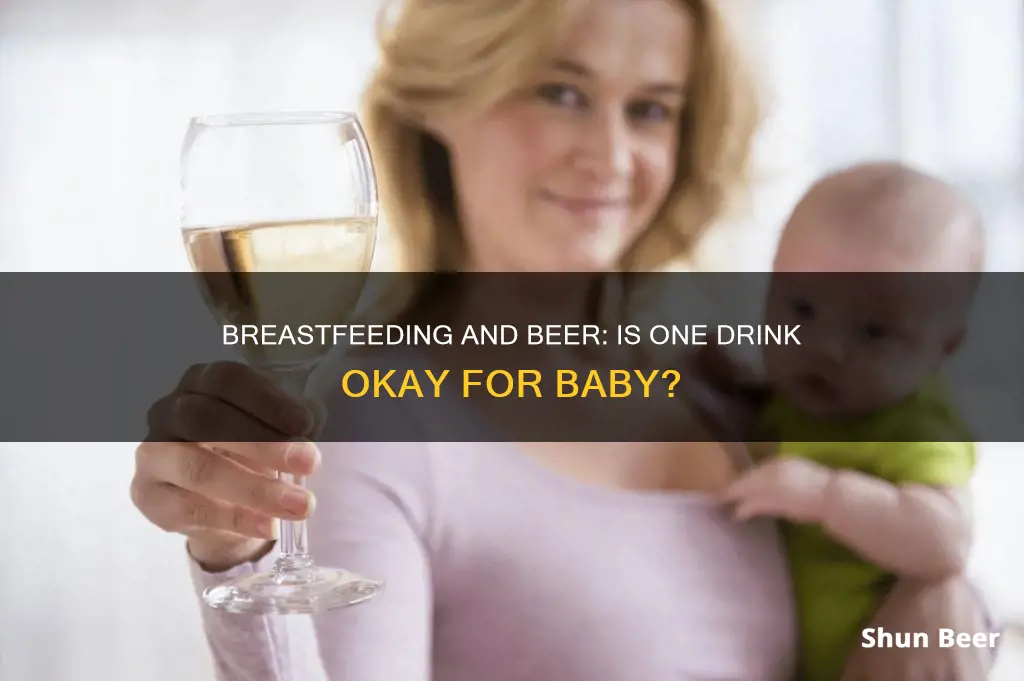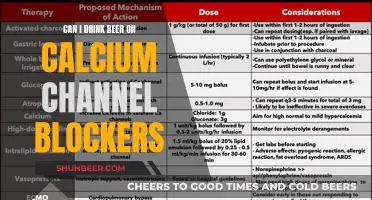
Drinking alcohol while breastfeeding is a topic that invites conflicting advice. While drinking in moderation is generally considered safe, there are some important factors to consider. Firstly, alcohol passes freely into breast milk and can impair a baby's sleep, motor skills, and weight gain. Secondly, the amount of alcohol ingested and individual factors like body weight influence how long it takes for the alcohol to leave the breast milk. Therefore, it is recommended to wait for at least two hours after drinking before breastfeeding again. Additionally, drinking alcohol can negatively affect milk supply and the milk ejection reflex. While occasional drinking is not proven harmful, regular and excessive consumption can lead to issues for both mother and child.
| Characteristics | Values |
|---|---|
| Is it safe to drink one beer while breastfeeding? | It is likely safe to drink very moderately while breastfeeding, if you take a few precautions. Having one drink a day hasn't been found to be harmful to a nursing baby, especially if you wait at least two hours between drinking and nursing or pumping. |
| How long should I wait to breastfeed after drinking one beer? | It takes about two hours for the average adult to metabolize one drink. It is recommended to wait for the alcohol level in your breast milk to drop before you nurse or pump. |
| Does drinking alcohol affect breast milk production? | Drinking alcohol can decrease breast milk production and affect how much milk your baby drinks. Alcohol has been shown to affect babies' sleep patterns, disrupting their sleep after even a small to moderate amount of alcohol. |
| Does drinking alcohol while breastfeeding cause any long-term harm to the baby? | Some researchers have concluded that repeated exposure to alcohol in breast milk could cause long-term harm to nursing babies. |
What You'll Learn

How long after drinking can you breastfeed?
It is recommended that you wait at least two hours after drinking one beer before breastfeeding. This is because it takes this amount of time for the alcohol to metabolize and leave your breast milk. The more you drink, the longer it will take for the alcohol to leave your system. For example, if you have two drinks, you should wait four to five hours before breastfeeding.
The amount of time it takes alcohol to leave your breast milk depends on several factors, including your weight, how much you drink, how fast you drink, whether you eat food while drinking, and how quickly your body breaks down alcohol. Generally, smaller mothers will need more time to process and eliminate alcohol from their bloodstream.
It is important to note that drinking alcohol while breastfeeding can have negative effects on your baby's sleep and milk intake. Additionally, continued long-term exposure to alcohol through breast milk could potentially impact your baby's growth, cognition, and development. Therefore, it is recommended to drink in moderation and plan carefully if you choose to drink alcohol while breastfeeding.
Beer Drinking in Oklahoma: Sunday's Special Rule
You may want to see also

How long does alcohol stay in breast milk?
The amount of time alcohol stays in breast milk depends on several factors, including the amount of alcohol consumed, the rate of consumption, whether it was consumed with food, the mother's weight, and individual variations in alcohol absorption and metabolism.
According to experts, it takes about two to three hours for alcohol to be cleared from breast milk after consuming a single drink. However, this duration extends with the number of drinks consumed. For example, two drinks may require four to five hours, while three drinks may take six to eight hours, and so on.
It's important to note that the level of alcohol in breast milk corresponds to the amount in the mother's bloodstream. As blood alcohol content decreases, so does the alcohol content in the milk. Therefore, the time it takes for alcohol to leave breast milk is influenced by how long it takes for an individual to metabolize alcohol, which can vary from person to person.
To ensure the safety of the baby, it is generally recommended to wait at least two hours after consuming alcohol before breastfeeding or pumping milk. This allows sufficient time for the alcohol to metabolize and reduce the alcohol content in the milk.
Additionally, the type of alcoholic beverage and its alcohol content also play a role in how long alcohol stays in breast milk. The higher the alcohol content, the longer it will take for the alcohol to clear from the mother's system and breast milk.
Drinking Beer at Whole Foods: What You Need to Know
You may want to see also

Do you have to pump and dump after drinking?
Pumping and dumping is a method used by breastfeeding parents to discard their breast milk after consuming alcohol or drugs. While it is not necessary to pump and dump after drinking, there are certain situations in which it may be beneficial or necessary.
Firstly, it is important to understand that lactation is a supply-and-demand system. Therefore, if you are unable to breastfeed or pump and store your milk for your baby, pumping and dumping can help maintain your milk supply and prevent issues such as swelling, soreness, and mastitis. Pumping and dumping can also be useful if you are experiencing discomfort or engorgement due to a missed nursing session while drinking or being away from your baby. In this case, you can pump and dump to relieve the discomfort, but the milk should be discarded as it may not be safe for your baby.
It is recommended to wait at least two hours after having one drink before breastfeeding or pumping and storing milk for your baby. If you have consumed more than one drink, it is advisable to wait for a longer period, typically around four to five hours. The more drinks you have, the longer it takes for the alcohol to clear your system, and the higher the levels of alcohol in your milk. Therefore, if you are drinking over an extended period, such as at a wedding, you may need to pump and dump to relieve engorgement, but the expressed milk should be discarded.
It is important to note that pumping and dumping does not reduce the amount of alcohol or other substances in your milk. The levels of alcohol in your milk will decrease as the blood alcohol level falls over time. Therefore, it is not necessary to pump and dump to get rid of the alcohol in your milk; instead, you can simply wait for it to metabolize. Additionally, if you feel buzzed or drunk, it is best to refrain from breastfeeding or pumping until you feel sober.
In summary, while pumping and dumping after drinking is not always necessary, there are situations in which it may be beneficial or necessary for comfort or to maintain milk supply. However, it is important to prioritize the safety of your baby and ensure that any expressed milk is safe for consumption before feeding it to your infant.
Easton Beach, RI: Beer Drinking Allowed?
You may want to see also

What happens if the baby drinks breast milk with alcohol?
It is not advisable to feed a baby breast milk with alcohol. The amount of alcohol in the breast milk depends on the amount of alcohol consumed and the mother's blood alcohol level. The more alcohol consumed, the longer it takes for the alcohol to leave the mother's system. Generally, it takes about two to three hours for the alcohol to leave the breast milk, but this can vary depending on individual factors such as weight, the amount of food consumed with the alcohol, and the rate at which the body breaks down alcohol.
If a baby is fed breast milk containing alcohol, they may experience negative effects such as drowsiness, deep sleep, weakness, abnormal weight gain, and impaired motor development. Research has also shown that exposure to alcohol in breast milk can cause sleep disturbances in babies, including shorter sleep periods, more frequent wakefulness, and reduced total active and REM sleep. Additionally, there may be potential long-term effects on the baby's development, including impaired cognitive development and reduced ability for abstract reasoning at school age.
To minimise the amount of alcohol in breast milk, it is recommended to breastfeed before consuming alcohol and then wait for the alcohol to metabolise, which is usually about two hours per drink. If the breasts become full while waiting, it is safe to hand-express or pump and discard the milk, but this will not speed up the elimination of alcohol from the body.
Weed Beer: How Does It Work?
You may want to see also

Beer and breastfeeding: Is there a link to increased production?
The short answer
No, beer does not increase milk supply. While the barley in beer can boost prolactin production, the alcohol component decreases milk production and inhibits the milk ejection reflex.
The long answer
Occasional drinking is okay
If you're breastfeeding, experts recommend cutting out drinking completely or limiting your alcohol consumption. If you do choose to drink, it's probably safe to drink very moderately while breastfeeding, if you take a few precautions. Having one drink a day hasn't been found to be harmful to a nursing baby, especially if you wait at least two hours between drinking and nursing or pumping.
Alcohol does pass into breast milk
Alcohol is present in a woman's milk at the same level as in her blood. It rises and falls along with blood alcohol levels and has been found to peak about 30 to 60 minutes after consumption, or 60 to 90 minutes when drunk with food.
Drinking alcohol can affect milk supply
While a barley component in beer – not the alcohol – does boost prolactin production, alcohol decreases milk production and inhibits the milk ejection reflex. Studies have shown that babies consume less milk in the three-to-four-hour period after mothers consumed a small to moderate amount of alcohol.
Alcohol abuse affects the baby
If you are regularly consuming large amounts of alcohol, this could harm the baby. Excessive drinking by the mother can result in slow weight gain or failure to thrive in her baby. Alcohol abuse can affect milk letdown and may result in not breastfeeding enough. The baby may sleep more and miss breastfeeds, or may not suck effectively, leading to decreased milk intake. The baby may even suffer from delayed motor development.
Is Day-Old Beer Safe to Drink?
You may want to see also
Frequently asked questions
Yes, but it is recommended to wait at least two hours after drinking to breastfeed.
It is generally recommended to wait at least two hours after drinking alcohol to breastfeed. This is because it takes about two hours for the average adult to metabolize one drink.
Drinking alcohol while breastfeeding can potentially cause negative effects on the baby's sleep patterns, weight gain, and milk intake. It can also decrease the mother's milk supply and delay the let-down reflex.
Yes, occasional drinking of one drink per day is not considered harmful to the baby. However, regular consumption of alcohol can negatively affect the mother's milk supply and let-down reflex.







